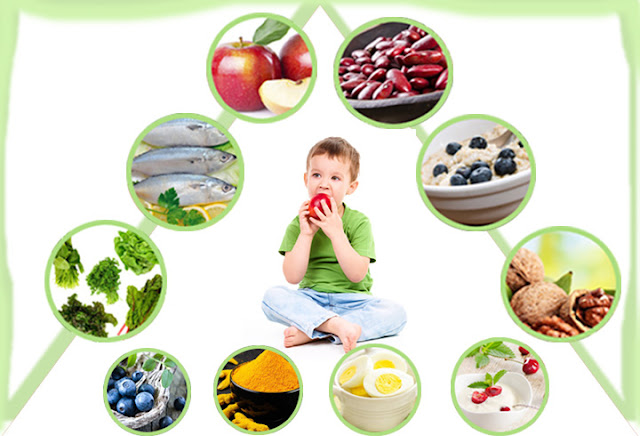As we get older our ability to recall information can diminish, but we are not powerless against this. There are foods that will help keep your brain healthy and sharp. Avoiding blows to the head will help as well. Here are the basics about the health benefits for your brain.
Vitamin E
 According to the Dietary Guidelines of America, 90% of Americans are not getting their daily dose of vitamin E. Vitamin E is an anti-oxidant (helps fight free radicals that cause cancer). Vitamin E helps protect the membranes from oxidation and the omega-3s from something called peroxidation. Peroxidation is the process, by which free radicals "steal" electrons from the lipids in cell membranes, which causes cell damage. 97% of DHA (omega-3 docosahexaeonic acid) is found in the brain, and accounts for 30% of the structural fats in the gray matter.
According to the Dietary Guidelines of America, 90% of Americans are not getting their daily dose of vitamin E. Vitamin E is an anti-oxidant (helps fight free radicals that cause cancer). Vitamin E helps protect the membranes from oxidation and the omega-3s from something called peroxidation. Peroxidation is the process, by which free radicals "steal" electrons from the lipids in cell membranes, which causes cell damage. 97% of DHA (omega-3 docosahexaeonic acid) is found in the brain, and accounts for 30% of the structural fats in the gray matter.
Vitamin E found in foods does a lot of beneficial stuff that taking vitamin E supplements will not do, so get your vitamin E through your diet. You can find vitamin E in chili powder, dried basil, dried oregano, dried parsley, paprika, toasted almonds, almond butter, roasted sunflower seeds, sunflower oil, peanuts, peanut butter, wheat germ, sockeye salmon, tuna, tomatoes, oatmeal, broccoli, green olives, asparagus, spinach, swiss chard, kale, rice, mangoes, kiwi, dried apricots, butternut squash, red bell peppers, and avocados.
Omega-3 Fatty Acids and DHA
There are numerous studies that show a link between omega-3 fatty acids DHA and protective benefits to the brain. It appears to reduce the chances of getting Alzheimer's, as well as vascular dementia. Two separate studies show that eating fatty fish once per week reduces the risk of Alzheimer's by 60%. Omega-3s are particularly important to the developing infant brain. There are omega-3 supplements on the market, but they tend to be EPA heavy, and the studies indicate that it is the DHA in the omega-3s that offer the benefits to the brain, not the EPA. So again it is best to get your nutrients through food rather than supplements, which is especially important with omega-3s, since we only get them through food. Our bodies cannot produce omega-3s.
Omega-3s with DHA can be found in fatty fish, fish oil, eggs, crab, lobster, shrimp, clams, mussels, oysters, scallops, conch, and octopus. The list of fish that fit the description is quite large, but some of the more popular variety include; tuna, salmon, cod, eel, catfish, haddock, halibut, herring, mackerel, swordfish, shark, and snapper.
And don't forget that having a glass of wine with your omega-3s is not only fun, but the polyphenols in the grapes allow your body to absorb even more of the omega-3s. Mixing blueberries and walnuts together gives a boost to the brains defenses against free radicals.
B6, B12 and Folate
This holy trinity reduces the levels of homocysteine in the blood. Homocysteine is associated with greater risk of stroke, cognitive impairment, and Alzheimer's. Essentially these three help to reduce shrinkage of the brain (in both warm and cold weather), but the studies are not showing the same link when it comes to supplements of the holy trinity, so stick with food to get your source.
There is vitamin B6 in most meats, fish, and poultry, especially in the organs. Sunflower seeds, pistachio nuts, dried apricots, prunes, or raisins, bananas, avocados, spinach, beans, lentils, asparagus, lettuce, broccoli, mangoes, oranges, crab, clams, white bread, eggs, swiss cheese, and skim milk. You can find vitamin B12 in most dairy products, meat, poultry, oysters, clams, mussels, fatty fish, and eggs.
Folate can be found in most leafy greens, broccoli, artichokes, asparagus, brussel sprouts, beets, potatoes, avocado, papaya, beans, lentils, peas, sunflower seeds, and the organs of meat.
Zinc
Zinc helps to regulate communication between neurons and the hippocampus, and this helps to improve both memory and learning ability. Tests with mice have shown a strong correlation between the level of zinc and cognitive functions. Zinc can be found in most dairy products, wheat germ, meat, poultry, beans, pumpkin or squash seeds, nuts, sunflower seeds, eggs, oysters, crab, octopus, scallops, lobster, mussels, and shrimp.
Vitamin K
Vitamin K is something that is still being studied, and is only partially understood. It helps in the synthesis of sphingolipids, which is a crucial fat that helps protect the myelin sheath, which protects the nervous system. Vitamin K can be found in most leafy greens, broccoli, brussel sprouts, chili powder, basil, pickles, olive oil, dried prunes, blueberries, pears, peaches, figs, and currents.





0 commentaires:
Enregistrer un commentaire